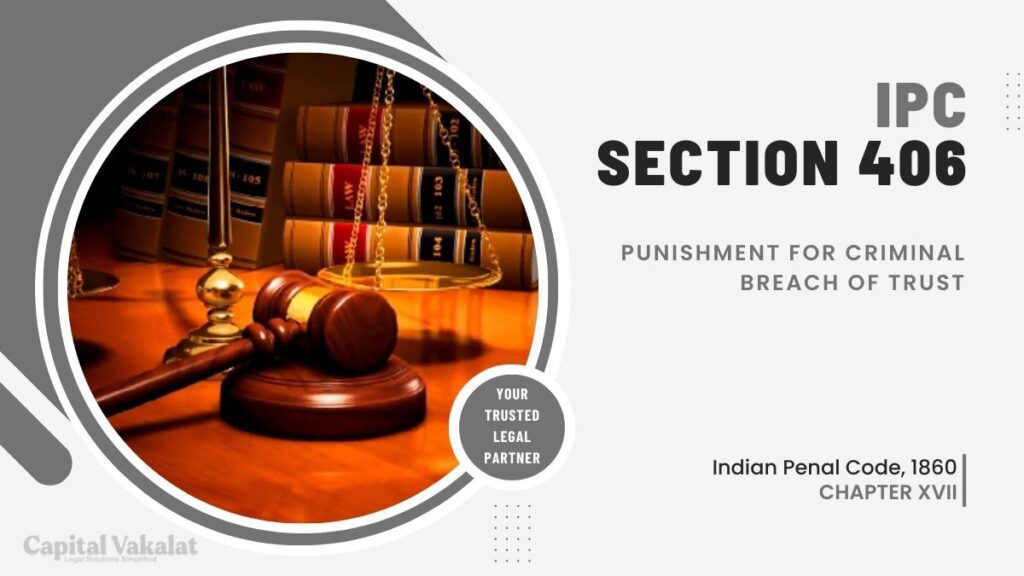Criminal breach of trust, as stipulated in Section 406 of the Indian Penal Code (IPC), is a legal term that carries significant weight in the realm of jurisprudence.

Understanding the intricacies of this section is crucial for comprehending the legal consequences and protecting oneself from potential legal pitfalls.
Key Elements of Section 406 IPC
At its core, Section 406 defines criminal breach of trust as an act where someone, entrusted with property, dishonestly misappropriates or converts it for their benefit. This breach involves a violation of trust and is a serious offense under the IPC.
Acts Constituting Criminal Breach of Trust
The section encompasses various acts that constitute a breach of trust. This includes the misuse of property, fraudulent conversion of assets, and engaging in activities that result in unlawful gains for the perpetrator. Each act is examined within the legal framework to determine the severity of the breach.
Punishments Under Section 406 IPC
Offenders found guilty of criminal breach of trust face stringent legal consequences. The law prescribes fines and imprisonment, with the severity of the punishment depending on the nature and magnitude of the breach. Understanding the potential repercussions is vital for both legal practitioners and the general public.
Cases and Precedents
Examining past cases provides insights into the application and interpretation of Section 406. Prominent legal cases and precedents shed light on the nuances of the law and how the judiciary navigates complex situations involving criminal breach of trust.
Protecting Against Criminal Breach of Trust
Individuals and businesses can take legal precautions to safeguard themselves against potential breaches of trust. Drafting clear contracts, agreements, and documentation becomes imperative in establishing legal boundaries and expectations.
Role of the Police and Judiciary
Reporting instances of criminal breach of trust initiates the involvement of law enforcement agencies and the judicial process. Understanding the roles of the police and the judiciary in handling such cases is essential for victims and those seeking legal recourse.
Impact on Businesses and Individuals
The ramifications of a criminal breach of trust extend beyond legal consequences. Businesses may suffer reputational damage, while individuals may find it challenging to rebuild trust in personal and professional relationships. Exploring these impacts provides a holistic view of the consequences.
Comparative Analysis with Other Legal Sections
Section 406 is not isolated in the legal landscape. A comparative analysis with other related legal sections elucidates the distinctions and specificities of criminal breach of trust. Legal professionals and enthusiasts gain a more comprehensive understanding of the legal framework.
Conclusion
In conclusion, Section 406 IPC addresses a critical aspect of trust within the legal system. From defining the offense to exploring its impact on individuals and businesses, a thorough understanding of this section is essential. Legal awareness and adherence to preventative measures can contribute to a more transparent and trustworthy society.
Frequently Asked Questions
What factors determine the severity of punishment under Section 406?
The nature and extent of the breach, as well as the amount involved, play a significant role in determining the severity of punishment, including fines and imprisonment.
How can businesses protect themselves from potential breaches of trust?
Implementing robust internal controls, thorough background checks, and clear contractual agreements can help businesses minimize the risk of criminal breach of trust.
Is there a statute of limitations for filing a case under Section 406?
The statute of limitations varies, and it’s essential to consult legal experts to determine the timeframe within which a case must be filed.
Can a person be charged under both civil and criminal laws for breach of trust?
Yes, a person can face both civil and criminal charges concurrently for breach of trust, as these legal proceedings serve different purposes and standards of proof.